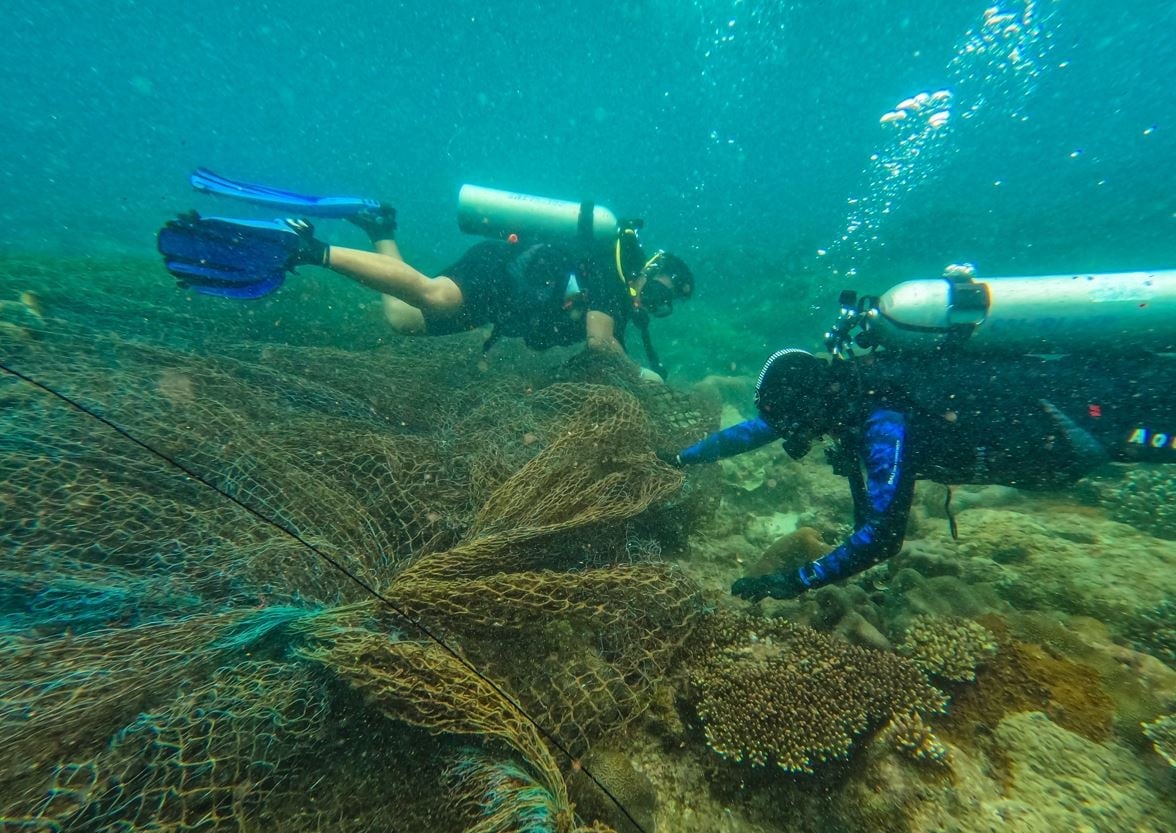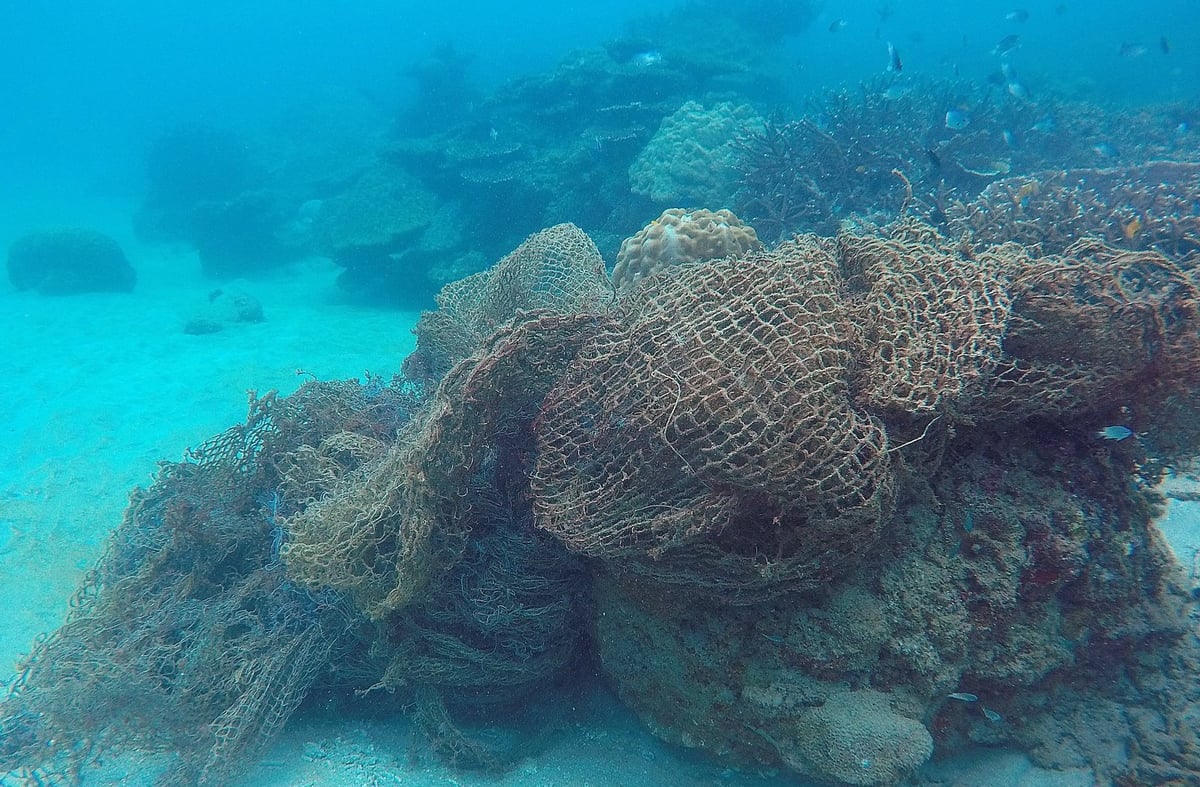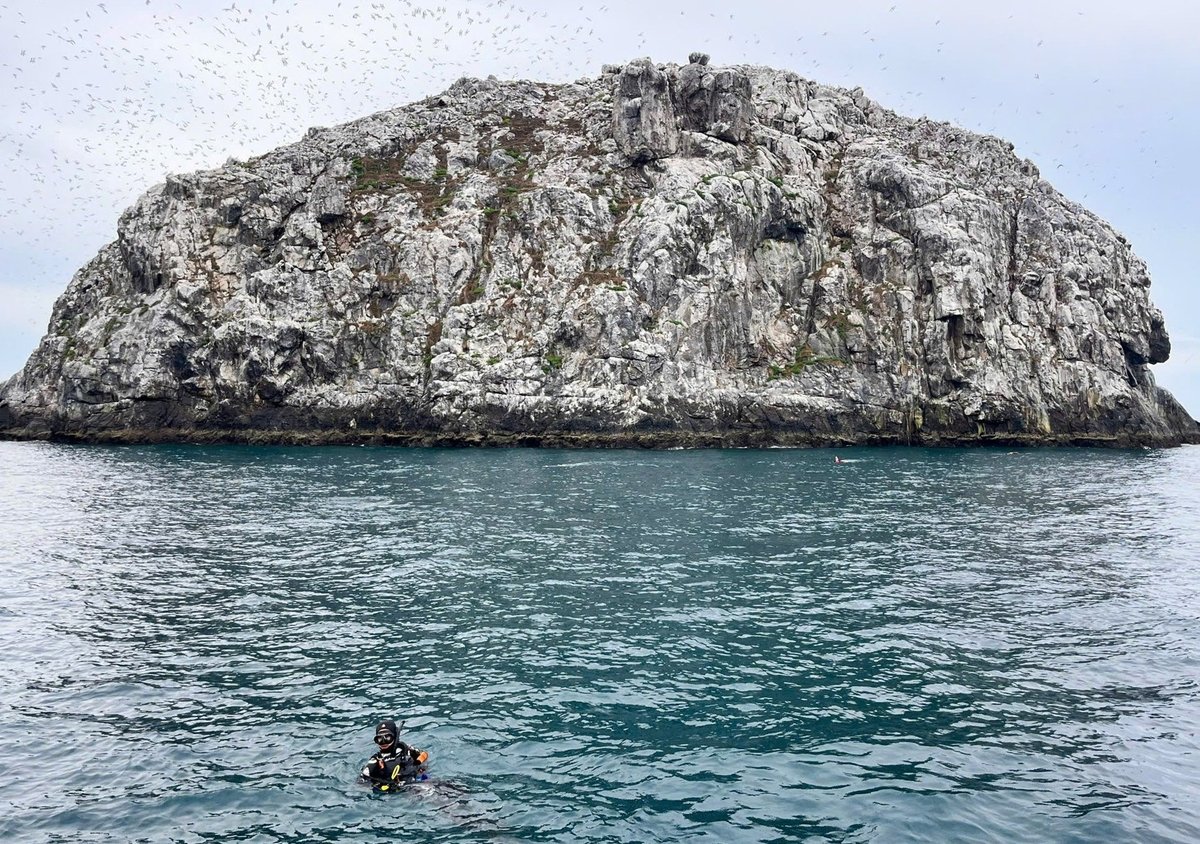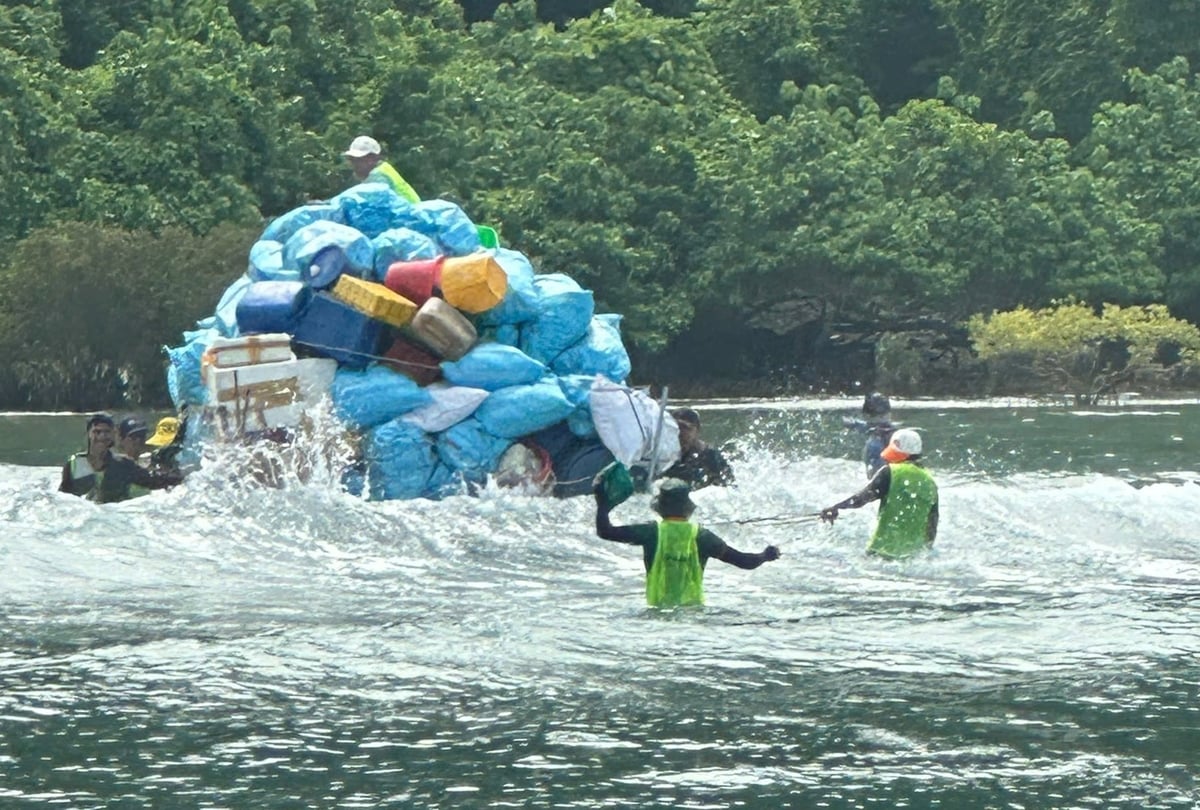November 9, 2025 | 05:56 GMT +7
November 9, 2025 | 05:56 GMT +7
Hotline: 0913.378.918
November 9, 2025 | 05:56 GMT +7
Hotline: 0913.378.918
In late June 2024, 21 members of the Viet Divers Center (Ho Chi Minh City) arrived at the waters around Hon Trung and Hon Tai. They weren’t there to admire the coral or play with sea turtles, but to carry out a more meaningful mission.
Viet Divers collaborated with the Koral Asia – Save the Ocean project on this trip, with the goal of planting green seeds for the younger generation. Their mission was to collect ocean waste, remove ghost nets from coral reefs, and capture crown-of-thorns starfish, a species that devastatingly impacts coral ecosystems when the marine balance is disrupted.

Each dive, professional dive teams hauled tons of marine debris out of the reefs, helping restore clarity and health to the ocean. Photo: Nguyen Van Vung.
Over three days, the team collected 520 kg of ghost nets, captured 50 crown-of-thorns starfish, and gathered more than 3 cubic meters of plastic waste. Most of it was water bottles, styrofoam boxes, plastic bags, and fragments of fishing gear washed in from distant seas. Notably, five children aged 11 to 17 joined the mission. They were wearing diving tanks, cutting nets, and hauling trash, not for entertainment but to understand that the ocean needs saving.
“They saw with their own eyes the bleached corals, the absence of dense fish populations like those in books, and plastic bags tangled around the reefs. That’s a lesson they’ll never forget,” said Ms. Ngoc Anh, a representative from Viet Divers, emotionally.
In Con Dao, a dedicated group of divers is also quietly taking on the responsibility of keeping the ocean floor clean. Dang Thanh Tung, 32, a former diving instructor, now volunteers as a “professional trash remover.”
“Since 2022, I quit guiding tourists and switched to full-time underwater cleanups for a service company. It can take over an hour to remove a single plastic bag stuck in coral. Sometimes we dive 15 meters deep, with murky water and zero visibility, cutting nets purely by feel,” Tung shared.
According to data from the Con Dao National Park and WWF Vietnam, the dedicated diving team has collected over 6 tons of seabed waste since 2022, 70% of which is plastic and non-biodegradable materials. The hotspots include Hon Cau, Hon Tre Lon, and Hon Bay Canh – areas rich in coral reef ecosystems yet heavily burdened by massive amounts of debris drifting from the mainland.

Many ocean-saving activities have been carried out in Con Dao, with tons of waste brought ashore for treatment or repurposed as tools for awareness-raising and community education. Photo: Nguyen Van Vung.
The Con Dao National Park Management Board reported that around 14 sea turtles have died due to ingesting plastic or becoming entangled in ghost nets. One green turtle that washed ashore at Hon Ba was found with over 300 grams of plastic waste in its stomach. That image has prompted many divers to give up paid work to save turtles and save the ocean.
According to Mr. Nguyen Khac Pho, Director of the Con Dao National Park Management Board, marine debris drifting in from the ocean constantly attacks the park's islands, especially during the southwest monsoon season. Although local forest rangers regularly collect trash, environmental sanitation efforts in remote and hard-to-reach areas are often overwhelmed.
"The involvement of organizations and individuals in collecting ocean waste helps reduce the threats faced by marine life in Con Dao. More importantly, we call on fishermen and the entire community to raise environmental awareness not only for the sake of marine creatures but also for the preservation of our own living environment," Mr. Pho emphasized.
The issue of ocean waste in Con Dao is no longer just a warning. It is a real and ongoing crisis. Even more concerning, debris on the seabed doesn’t just ruin the landscape or kill marine life. It silently makes its way into the human food chain.
According to a 2023 study published in the Marine Pollution Bulletin, many economically valuable marine fish species have been found to contain microplastics in their tissues. A preliminary survey conducted by a group of students in Con Dao showed that 100% of anchovy samples collected at the local market displayed signs of microplastics under the microscope.
Therefore, saving the ocean is not only about protecting turtles or coral reefs; it is also about protecting what ends up on our dinner plates. Plastic doesn’t decompose. It travels through the fish and eventually into our stomachs.

Volunteers are collecting ocean waste in the Hon Trung area. Photo: Le Hong Son.
In response to this situation, in June 2022, the Con Dao District People’s Committee and the project Reducing Ocean Plastic Waste in Vietnam (WWF) joined forces to tackle the issue.
After three years of implementation, Con Dao is emerging as a model for multi-stakeholder collaboration in reducing plastic waste. As part of efforts to protect the marine environment and promote sustainable tourism, the island district signed on to implement the “Plastic Smart Tourism” model in partnership with WWF Vietnam and more than 40 local businesses.
According to a report by the Con Dao Special Administrative Region, the island generates around 634 tons of plastic waste annually, most of which comes from tourism and service activities. The new commitment sets a target of reducing plastic leakage by at least 30% by 2025, aiming to eliminate single-use plastics in all tourism establishments by 2030.
What sets Con Dao’s model apart is the collective effort among various groups: local authorities, businesses, residents, and international conservation organizations. These groups work together across a chain of solutions, including communications and education, source segregation, eco-friendly alternatives, expanding “Zero Waste Markets” and “Green Houses,” regular monitoring, and underwater waste collection.
Beyond slogans, concrete actions are being taken: many hotels and restaurants have switched to glass bottles and paper straws; students take part in “Trash-Free Sundays”; fishermen collect and return ghost nets to shore; and international organizations provide training in ocean waste cleanup.

The ocean waste cleanup team is transporting trash from Hon Bay Canh to the landfill for disposal. Photo: Le Hong Son.
Mr. Nguyen Van Da, Deputy Director of the Department of Agriculture and Environment of Ho Chi Minh City, praised Con Dao’s efforts in combating ocean waste. Once a tourism island under pressure from plastic pollution, Con Dao is now becoming a symbol of collective action, where commitments are not just words on paper but brought to life through the actions of the entire community.
Corals have bleached, turtles have died from plastic, and waste continues to drift in. Yet it is those quiet, determined hands that are slowly pulling Con Dao out of the raging tide of plastic.
The heart of the ocean won’t beat on its own. That’s why protecting the ocean means protecting ourselves.
Translated by Kieu Chi

(VAN) MAE's joint working group will implement the EUDR Adaptation Action Plan, starting with the comprehensive national database development and management.

(VAN) Developing a clean energy ecosystem is a key solution for controlling pollution and achieving the Net Zero emissions target.

(VAN) At the forum 'Green Energy - Clean City,' experts and businesses emphasized that Viet Nam needs a coordinated roadmap aligning emission control with the standardization of clean fuels.

(VAN) Hanoi is developing a roadmap for emission control, green transport, and clean fuel use, aiming to become a low-emission and sustainable city.

(VAN) Authorities in Slovenia have uncovered the presence of paracetamol in non-processed pickles in acid from India.

(VAN) The Ministry of Agriculture and Environment of Vietnam has signed a new Memorandum of Understanding (MOU) with WWF, focusing on nature conservation, green development, and sustainable emissions reduction.

(VAN) Viet Nam's strong commitment to green energy, supported by businesses, scientists, and the public, is a shared national mission.